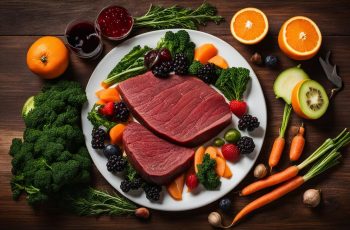Welcome to my blog, where we’ll explore the benefits of incorporating an alkaline diet plan into your lifestyle. The alkaline diet is gaining popularity for its potential to improve overall health and well-being by focusing on the pH balance of the body. By choosing alkaline foods and avoiding acidic ones, we can optimize our body’s pH level and support various aspects of our health.
So, what exactly is an alkaline diet? It’s a way of eating that emphasizes consuming foods that have an alkalizing effect on the body, promoting balance and reducing acidity. The alkaline diet consists of a wide range of fruits, vegetables, whole grains, lean proteins, and healthy fats that are rich in essential nutrients, vitamins, minerals, and antioxidants.
Importance of Balanced Alkaline Diet Plan
Following an alkaline diet plan can have numerous benefits for your overall health. By maintaining a balanced pH level, you can:
- Promote a healthy weight and potentially support weight loss goals
- Reduce the risk of developing certain diseases
- Improve heart health and reduce the risk of cardiovascular problems
- Enhance the body’s ability to absorb essential vitamins and minerals
- Boost the immune system and protect against illness and infection
- Combat inflammation and reduce pain
- Preserve muscle and bone mass
Are you ready to start incorporating alkaline foods into your diet? In the next section, we’ll dive deeper into the alkaline diet, exploring how it works and how to implement it into your daily routine.
Uncovering the Alkaline Diet Plan
- An alkaline diet focuses on consuming foods that have an alkalizing effect on the body.
- It aims to optimize the body’s pH level, promoting better health and well-being.
- An alkaline diet consists of fruits, vegetables, whole grains, lean proteins, and healthy fats.
- Following an alkaline diet can lead to benefits such as weight management, improved heart health, enhanced immunity, and reduced inflammation.
- Next, we’ll dive deeper into understanding the alkaline diet and how to incorporate it into your lifestyle.
Understanding the Alkaline Diet
The alkaline diet is a popular eating plan that focuses on the concept of pH balance in the body. According to this theory, consuming alkaline foods can help maintain a healthy pH level and reduce the risk of various health issues, while acidic foods can lead to increased acidity and potential health problems.
When starting an alkaline diet plan, it’s important to understand the relationship between diet and acidity levels in the body. Acidic foods, such as meat, dairy products, processed foods, grains, sugar, and caffeine, are believed to contribute to an acidic environment within the body. On the other hand, alkaline foods, including fruits, vegetables, whole grains, nuts, seeds, legumes, and certain condiments and beverages, are considered to have an alkalizing effect.
Following an alkaline diet plan involves making conscious choices and being mindful of the pH levels of the foods consumed. It’s recommended to incorporate more plant-based foods into your diet, such as fresh fruits and vegetables, as they are generally alkaline. Additionally, opting for whole grains, nuts, and seeds can help maintain a balanced pH level in the body.
- Start by increasing your consumption of alkaline foods, such as leafy greens, berries, citrus fruits, avocados.
- Include a variety of alkaline vegetables like broccoli, kale, spinach, and cucumbers in your meals.
- Incorporate whole grains like quinoa, brown rice, and oats into your diet.
- Choose plant-based protein sources like legumes, tofu, and tempeh instead of meat.
- Limit or avoid acidic foods like processed meats, dairy products, refined grains, sugar, and caffeine.
- Stay hydrated by drinking plenty of water, which is considered alkaline and helps maintain proper pH levels in the body.
While there are alkaline diet plan guidelines to follow, it’s essential to remember that the alkaline diet is not supported by extensive scientific evidence. More research is needed to fully understand the benefits and limitations of this dietary approach.
Health Benefits of an Alkaline Diet Plan
Following an alkaline diet plan has numerous potential health benefits. This eating approach is believed to possess anti-inflammatory properties, which can greatly improve overall health and well-being. By incorporating more alkaline foods into your diet, you may experience improvements in heart health, reduced inflammation and pain, protection against certain cancers, preservation of muscle and bone mass, enhanced vitamin absorption, a strengthened immune system, and potential weight loss. The alkaline diet emphasizes the consumption of nutritious and whole foods, contributing to a balanced and healthy eating plan.
Research suggests that following an alkaline diet may play a role in reducing the risk of chronic diseases, such as cardiovascular disease and cancer, due to its anti-inflammatory nature. Numerous studies have shown that the consumption of alkaline foods can help lower inflammation levels in the body, which is a common underlying factor in various chronic conditions. By reducing inflammation, an alkaline diet can help maintain optimal health, prevent the onset of diseases, and potentially slow down the aging process.
Moreover, an alkaline diet is rich in fruits and vegetables, which are known for their high levels of vitamins, minerals, and powerful antioxidants. These nutrients help protect the body against harmful free radicals and oxidative stress, which can contribute to the development of chronic diseases and aging. By choosing alkaline foods, you are providing your body with essential nutrients that support overall health and vitality.
The Importance of pH Balance
One of the key principles of an alkaline diet is the maintenance of pH balance in the body. The pH scale measures the acidity or alkalinity of substances, and our body operates within a specific pH range for optimal functioning. The goal of an alkaline diet is to shift the body’s pH from acidic to alkaline levels, creating a more alkaline environment which is believed to support better health.
When the body becomes overly acidic, it can lead to imbalances that contribute to various health issues, including inflammation, digestive problems, and weakened immune function. By consuming more alkaline foods, you can help restore pH balance and promote a healthier internal environment.

To fully understand the potential benefits of an alkaline diet on health outcomes, more research is needed. However, incorporating an alkaline diet can contribute to a well-rounded and nutritious eating plan that may positively impact your overall health and well-being.
Implementing an Alkaline Diet
Implementing an alkaline diet is a journey towards better health and wellness. By making conscious food choices and adjusting our eating habits, we can gradually shift towards a more alkaline-focused lifestyle. Here are some tips and guidelines to help you get started:
1. Incorporate Alkaline Foods into Your Diet
To follow an alkaline diet, it’s essential to include plenty of alkaline foods in your meals. These include fruits like apples, bananas, and berries; vegetables such as spinach, kale, and broccoli; whole grains like quinoa and brown rice; and plant-based protein sources like legumes and nuts.
2. Create a Balanced Meal Plan
Creating a meal plan can help ensure a balanced intake of both alkaline and acidic foods. Consider incorporating alkaline food options into each meal and snack throughout the day. A well-rounded meal plan can include alkaline-rich smoothies, salads, stir-fries, and grain bowls.
3. Increase Fruit and Vegetable Consumption
Fruits and vegetables are key components of an alkaline diet. Aim to include a variety of colorful fruits and vegetables in your meals and snacks, as they are packed with essential vitamins, minerals, and antioxidants. Don’t hesitate to experiment with different cooking methods, such as steaming or roasting, to retain their nutritional value.
4. Opt for Lean Protein Sources
While the alkaline diet promotes a plant-based approach, if you choose to include animal protein, opt for lean cuts of meat like chicken or turkey. Plant-based protein sources such as beans, lentils, and tofu are also excellent choices and can easily be incorporated into your meals.
5. Reduce Processed and Packaged Foods
Processed and packaged foods tend to be high in refined sugars, unhealthy fats, and additives. These foods are often acidic and may not align with an alkaline diet. Focus on whole, unprocessed foods as much as possible to maintain a healthier pH balance.
6. Limit Refined Carbohydrates
Refined carbohydrates like white bread, white pasta, and sugary cereals can disrupt the body’s pH balance. Replace these with healthier alternatives like whole grains, such as quinoa, brown rice, and whole wheat bread, to promote an alkaline environment in your body.
7. Stay Hydrated with Water
Hydration is important for overall health and maintaining the body’s pH balance. Aim to drink plenty of water throughout the day to support proper digestion, hydration, and detoxification processes. Consider alkaline water, known for its higher pH levels, as a refreshing and hydrating option.
Remember, everyone’s nutritional needs are unique. It’s important to listen to your body and make adjustments that work for you. If you have specific health concerns or questions, consulting with a healthcare professional or registered dietitian can provide personalized guidance and support on your alkaline diet journey.

Conclusion
The alkaline diet offers a holistic approach to improving health by focusing on the balance of pH levels in the body. While there is still ongoing research to fully understand the impact of this diet, incorporating alkaline foods into a balanced eating plan can contribute to overall nutrition and wellness.
By following an alkaline diet plan, which includes a variety of alkaline and acidic foods, individuals can ensure they are meeting their nutrient needs while promoting a healthy pH balance. The alkaline food list includes fruits, vegetables, whole grains, nuts, and seeds, which offer a wide range of vitamins, minerals, and antioxidants.
However, it’s important to note that the alkaline diet should be approached with individual needs and goals in mind. Consulting with healthcare professionals or registered dietitians can provide personalized guidance and support to tailor the alkaline diet to fit specific requirements. Additionally, incorporating a balanced diet and maintaining an alkaline lifestyle, along with consuming alkaline water, can further support overall well-being.
While the alkaline diet holds potential health benefits, further research is necessary to fully understand its impact. It is crucial to approach the diet with a balanced mindset and seek professional guidance to create a personalized alkaline diet plan that aligns with individual needs for optimal health and wellness.
FAQ
What is an alkaline diet?
An alkaline diet is a dietary approach that focuses on consuming foods that have an alkaline effect on the body. These foods are believed to help maintain the body’s pH balance and promote optimal health.
What are the benefits of an alkaline diet?
Following an alkaline diet may have several potential benefits, including reduced inflammation, improved heart health, protection against certain cancers, preservation of muscle and bone mass, enhanced vitamin absorption, a strengthened immune system, and potential weight loss.
How do I start an alkaline diet?
To start an alkaline diet, you can begin by incorporating more alkaline foods such as fruits, vegetables, whole grains, nuts, seeds, legumes, and certain condiments and drinks into your meals. It is also important to reduce or avoid acidic foods such as meat, dairy, processed foods, grains, sugar, and caffeine.
Can an alkaline diet help with acidity?
Yes, an alkaline diet can help balance acidity in the body. By consuming alkaline foods, the pH levels in the body can shift towards alkalinity, reducing acidity and potentially alleviating symptoms associated with acidity.
What foods are alkaline?
Alkaline foods include fruits, vegetables, whole grains, nuts, seeds, legumes, and certain condiments and drinks. These foods have an alkaline effect on the body and can help maintain a balanced pH level.
How do I follow an alkaline diet?
To follow an alkaline diet, it is important to make mindful food choices by incorporating more alkaline foods into your meals. This can be achieved by including ample fruits, vegetables, whole grains, nuts, and seeds in your diet while reducing processed and packaged foods.
Are there any tips for following an alkaline diet?
Yes, some tips for following an alkaline diet include drinking plenty of water, incorporating plant-based protein sources, reducing refined carbohydrates, and listening to your body’s needs. You may also consider monitoring urinary pH levels and consulting a healthcare professional or registered dietitian for personalized guidance.
Is there a specific meal plan for an alkaline diet?
While there is no specific meal plan for an alkaline diet, you can create a plan by incorporating a variety of alkaline foods into your meals. This can include fruits, vegetables, whole grains, nuts, seeds, legumes, and healthy fats. It is important to maintain a balanced approach and ensure you are meeting all your nutrient needs.
Can alkaline water be part of an alkaline diet?
Yes, alkaline water can be part of an alkaline diet. It is a slightly alkaline beverage that can help maintain the body’s pH balance. However, it is important to note that alkaline water alone cannot replace a balanced diet.
Is there scientific evidence to support the alkaline diet?
While there is some scientific evidence to suggest potential health benefits of an alkaline diet, more research is needed to fully understand its impact. It is always advisable to approach dietary changes with a balanced mindset and seek guidance from healthcare professionals or registered dietitians.




